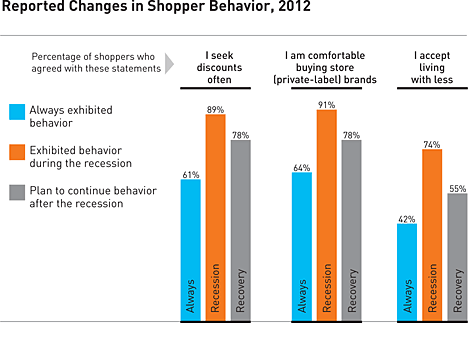The recent recession and high rate of unemployment have impacted spending habits around the world in a variety of ways. This economic period has forced many people to cut back and alter their spending habits. Fear, a difficult emotion to overcome, has entered the picture. A downturn in the economy can encourage people to return to a simpler lifestyle. Financial choices become more sensible and deliberate, and for many, it is unlikely that these spending reductions will be reversed. “Even when prosperity returns, 60% predict they will continue to spend less money than they did before” (http://www.socialmediaexplorer.com/digital-marketing/will-the-recession-change-our-buying-habits-for-good/).
Table courtesy of http://www.strategy-business.com/article/12401?gko=abe86
What is the complexion of the post-recession shopper?
- 72% of all shoppers say shopping behaviors have changed somewhat or significantly (http://www.pwc.com/us/en/retail-consumer/assets/the-new-consumer-behavior-paradigm.pdf).
- 55% of consumers indicate that they would rather have the best price than the best brand (http://www.wbiconpro.com/06-Priya.pdf).
- 2/3 of American shoppers cut coupons more frequently (http://www.strategy-business.com/article/12401?gko=abe86).
- Over 50% have reduced discretionary spending on things like entertainment, electronics, designer apparel, and dining out (http://www.wbiconpro.com/06-Priya.pdf).
- Over 50% of these consumers earn between $50,000 and $100,000 annually (http://www.prweb.com/releases/prweb9843676.htm).
The average consumer will shop at stores with lower prices even if it isn’t convenient. Consignment and resale shops have become more popular during the recession, and 99.6% of consignment shoppers plan to continue to shop at these locations (http://www.prweb.com/releases/prweb9843676.htm). For those who are tired of sacrificing, a “do-it-yourself” solution may be the answer in order to obtain more expensive products at a lower price. Online sales continue to increase which greatly affects the retail sales market. Consumers are beginning to adopt a new and very conscious set of standards.
What does this mean for the retailer? The new consumer values deals, promotions, and reward programs. Savings-related information must be easy to navigate and readily available. “Retailers should review the number of price points and optimize the numbers of gaps between price points in each category” (http://www.strategy-business.com/article/12401?gko=abe86). Private labels, used frequently during the recession, are now considered to be on par with the well-known brands. Consumers feel that these private labels are “good enough,” as opposed to a prior mind-set making premium brands a must. Consumers are able to go on-line to research and compare products before purchasing. It is imperative to engage shoppers in the full path from purchase to home and in-between (http://www.strategy-business.com/article/12401?gko=abe86).
It is not only important to understand consumer purchasing trends, but to also understand what psychologically drives his or her behaviors. Frugality is a learned behavior, and learned behaviors are difficult to change. Often times, these behaviors turn into habits (http://www.wbiconpro.com/06-Priya.pdf). Shopping has taken a more disciplined, thoughtful approach with less impulse and more reflective research before purchasing an item. Spending to excess is no longer in vogue.
Will focusing on promotions, better values and incentives, and the right demographic be the answers to capturing the competitive retail sales market? How else can retailers better address this new value-driven environment? Shoppers have found a new “normal” and they aren’t looking back.
Sources:
http://www.prweb.com/releases/prweb9843676.htm
http://www.pwc.com/us/en/retail-consumer/assets/the-new-consumer-behavior-paradigm.pdf
